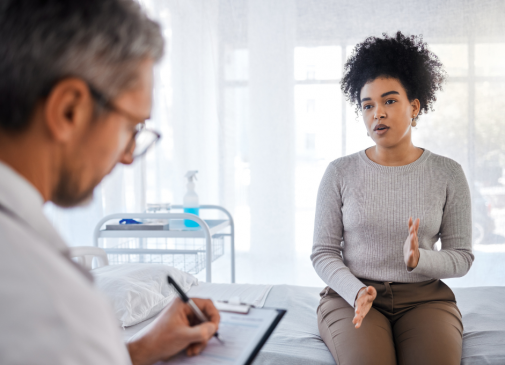
For many women, getting an accurate fibroid diagnosis and proper treatment is a challenge. On average, women wait three and a half years for treatment, and over 70% delay seeking care due to misinformation or dismissive doctors. Black women are diagnosed with fibroids three times more often than white women and face additional barriers to receiving timely and effective treatment.
Research from Harvard Health emphasizes how women’s health concerns, especially those related to menstrual symptoms, are dismissed, downplayed, or ignored. This phenomenon is known as medical gaslighting that leads to delayed or incorrect diagnoses. This lack of validation can result in unnecessary suffering and missed opportunities for early intervention and effective treatment.
Six Signs Your Doctor Isn’t Taking Your Fibroid Symptoms Seriously
1. They Dismiss Your Pain or Heavy Bleeding as “Normal”
Too many women are told that painful periods and heavy bleeding are just part of life. But they’re not. Fibroids are a leading cause of heavy menstrual bleeding, anemia and severe cramps. These symptoms can interfere with daily life, leading to missed workdays, emotional distress, and worsening health outcomes. Ignoring these symptoms can cause fibroids to grow, making treatment more complicated later on.
2. They Keep Pushing Birth Control as the Only Option
Birth control can help manage some fibroid symptoms, but it does not shrink fibroids. If your doctor only recommends birth control without discussing alternative treatments, they aren’t providing you with the full range of options. Minimally invasive procedures like uterine fibroid embolization (UFE) offer relief without major surgery.
3. They Blame Symptoms on Stress, Weight, or Age Without Proper Testing
Some doctors quickly attribute fibroid symptoms to lifestyle factors instead of ordering the necessary tests. Symptoms like pelvic pressure, bloating, and heavy periods can be mistaken for other conditions, leading to delayed treatment. Without an ultrasound or MRI, fibroids can go undiagnosed for years. Given that up to 80% of women develop fibroids by age 50, this is a serious medical issue, not just a lifestyle concern.
4. They Don’t Discuss Treatment Options Beyond Hysterectomy
Hysterectomy is not the only treatment for fibroids, but nearly 40% of women are pushed toward this option without being told about less invasive alternatives. In fact, 1 in 5 hysterectomies for fibroids may be medically unnecessary. If the only option presented to you is hysterectomy, seeking a second opinion from a fibroid specialist will give you a fuller range of treatment options.
5. They Refuse to Order Imaging or Specialist Referrals
If you’re experiencing fibroid symptoms, getting an ultrasound or MRI is an important step in confirming the diagnosis. Imaging provides a clear picture of the number, size, and location of fibroids, which helps determine the best treatment plan.
6. They Downplay Fertility Concerns
Fibroids can impact fertility depending on their size and location, so working with a specialist who understands these complexities is essential. If you’re planning to have children or facing challenges with conception, a fibroid specialist can thoroughly evaluate your condition and discuss treatment. These experts are usually well-versed in how fibroids affect reproductive health and should be able to guide you through options that best align with your personal goals and future plans.
How to Advocate for Yourself
If your doctor isn’t listening to your concerns, you have the right to advocate for better care. Here’s how:
| Ask for Imaging | Request an ultrasound or MRI to get a clear diagnosis and assess the size and location of fibroids. |
| Get a Second Opinion | If your doctor dismisses your symptoms, seek out a fibroid specialist who can accurately diagnose and treat your unique condition. |
| Research Treatment Options | Learn about UFE, myomectomy, medication, and other treatments so you can make an informed decision. |
| Prepare for Your Appointment | Keep a symptom journal detailing pain levels, bleeding patterns, and any other concerns to present a clear picture to your doctor. |
| Ask the Right Questions | -What tests do I need to confirm my fibroid diagnosis? -How will fibroids impact my overall health and fertility? -What are all my treatment options, and what are the risks and benefits of each? -Do you offer UFE or other minimally invasive treatments, or can you refer me to a specialist who does? -What should I expect in terms of fibroid growth and potential future treatment needs? |
Consider Seeing a Fibroid Specialist
Unlike a general practitioner, a fibroid specialist focuses exclusively on fibroid diagnosis and treatment. This specialized focus allows them to provide comprehensive care, including in-depth symptom evaluation, advanced imaging interpretation, and a wide range of treatment options, from medical management to minimally invasive interventions. They understand the full spectrum of fibroid-related issues and create a personalized plan to effectively address your specific symptoms and concerns.
Fibroid Fighters: Advocating for Your Health
At the Fibroid Fighters Foundation, we aim to educate women with fibroids about their options when it comes to finding effective treatment solutions. If you’re experiencing symptoms and want to get checked for fibroids, give us a call at 855-455-5262 or contact us online.
The Fibroid Fighters Foundation is passionate about connecting women with one another to share their unique stories about living with fibroids. If you want to share your fibroid journey and connect with others, check out our fibroid testimonial page here where you can talk about your experience via video, audio, or text.







